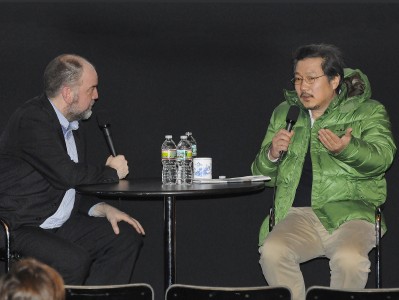
The Moral Tales of Hong Sangsoo
Frequently named one of the great master filmmakers of the 21st century, South Korean director Hong Sangsoo (b. 1961) has gained new prominence in recent years through a remarkable full dozen of assured and critically acclaimed features completed since 2010. Hong’s recent films have doubled his oeuvre and deepened the restless formal and philosophical introspection that has anchored his cinema from its earliest years. A nimble modernist impulse drives Hong’s boldly unorthodox approach to narrative, with each film inventing novel ways to fracture, bend and loop their profoundly moral tales of awkward, lonely men and women facing crucial life decisions and searching for a kind of redemption, a different path from their well-intentioned but also well-worn missteps. The playful reconfiguration of cause and effect, of linear story and established character, in films such as Hill of Freedom, Nobody’s Daughter Haewon and Yourself and Yours disorients but also disarms, asking the viewer to reconsider the basic perspective assumed as the common ground of cinematic narrative. In this way, Hong’s stubbornly unreliable narrators—whether through faulty memory, drunkenness or errant daydreaming—inspire the films’ embrace of the rambling late-night logic of a twice- or thrice-told tale. Repetition becomes a revelatory force in films such as Right Now, Wrong Then, making clear Hong’s abiding fascination with narrative itself as a quintessentially human impulse, a simultaneously therapeutic, self-serving but also a potentially uncanny force uniquely able to hold up an unexpected mirror to our elusive inner selves. With his celebrated recent films The Day After and On the Beach at Night Alone,an increasingly meditative and even spiritual quality has entered into Hong’s cinema, which examines human relationships—even on their most elemental, communicative level—as an ethical testing ground, a means to understand the potential and limits of empathy and understanding. While much has been made of the autobiographical thread increasingly legible across Hong’s films, especially in the recurrent figure of foolhardy film director-professors, The Day After and On the Beach at Night Alone explicitly offer stories parallel to Hong’s own recent life by carefully revealing the different levels of suffering produced by the fallout of extramarital and publicly scrutinized affairs. In these films, Hong gently implicates the viewer by asking us to consider what it means to judge others, just as we habitually do when we watch a narrative film, without fully recognizing our own heavily invested and often shifting points of view. – Haden Guest



















